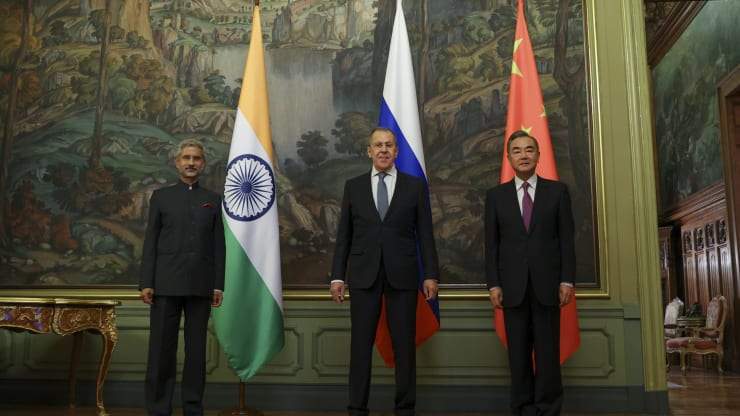India, China issue joint statement on border dispute calling for quick disengagement

Source: https://www.cnbc.com/2020/09/11/india-china-issue-joint-statement-on-border-dispute.html
India and China issued a joint statement over an ongoing border dispute in the Himalayas, calling for dialogue and disengagement to ease tensions between the nuclear-armed rivals.
It came after foreign ministers from both countries met at the sidelines of the Shanghai Cooperation Organisation meeting in Moscow on Thursday.
Discussions were “frank” and “constructive” between India’s Subrahmanyam Jaishankar and China’s foreign minister, Wang Yi, according to the Indian external affairs ministry.
“The two Foreign Ministers agreed that the current situation in the border areas is not in the interest of either side. They agreed therefore that the border troops of both sides should continue their dialogue, quickly disengage, maintain proper distance and ease tensions,” the statement said. It added that the countries agreed to abide by existing agreements and protocols on China-India boundary affairs and avoid actions that could escalate tensions.
“The two sides also agreed to continue to have dialogue and communication through the Special Representative mechanism on the India-China boundary question,” the statement said.
Troops on both sides have been engaged in a border dispute since May and in June, a fatal clash killed 20 Indian soldiers. China did not disclose if its troops had suffered any casualties. Earlier this week, New Delhi and Beijing accused each other of firing in the air during renewed confrontation at the unmarked border where opposing soldiers are positioned in close proximity.
Firearms are limited in the border areas under a previous agreement, which experts said highlighted the seriousness of this week’s confrontation.
Neither side willing to back down
Political risk consultancy Eurasia Group predicts a 60% probability of a scenario where the standoff continues with periodic flare-ups and skirmishes, causing limited casualties.
“So far, there have been multiple rounds of talks, meetings between the Special Representatives for the Boundary Question, a meeting of the defense ministers, and a meeting of the foreign ministers, and none of these negotiations have been successful in stemming new skirmishes,” Akhil Bery, South Asia analyst, and Kelsey Broderick, Asia analyst, at Eurasia Group, said in a Thursday note. They explained that neither side is likely to give an inch of perceived territory given the current state of bilateral ties.
Politically, India’s Prime Minister Narendra Modi cannot retreat, according to the analysts.
“He has already been under criticism for first, failing to acknowledge the Chinese incursions, and then secondly, stating that China had not entered Indian territory (even though it had),” they said, adding that any further loss of territory for India will hurt Modi’s “image as a strongman who will protect India.”
China’s President Xi Jinping will not back down either and “the signs are pointing towards this border remaining hot and standoffs continuing as both sides are preparing for a long, entrenched conflict.”
“This is not to say diplomacy will not continue. Commander-level talks are likely to continue, as will diplomatic meetings,” they added.
Eurasia Group also predicts a 25% chance of successful diplomatic negotiations leading to a de-escalation and a 15% probability for a deeper military conflict at the border.
Photo: Russian Foreign Minister, Sergey Lavrov, Chinese Foreign Minister Wang Yi and Minister of External Affairs of India Subrahmanyam Jaishankar pose for a photo during Meeting of the Council of Foreign Ministers of Shanghai Cooperation Organisation in Moscow, Russia on September 10, 2020.Russian Foreign Press Service Handout | Anadolu Agency | Getty Images











